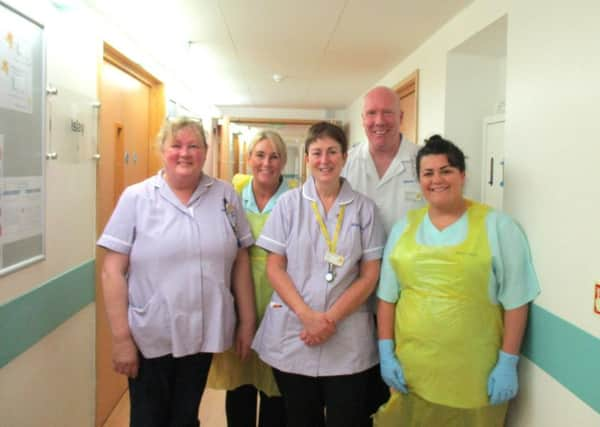Hilary Ford: Healthcare is all about ensuring the patient and their family come first


This is why it is important that organisations provide effective and supportive workplace cultures, improving staff relationships and ultimately patient care where the patient and their family come first.
Over the last eighteen months at the Marie Curie Hospice, Edinburgh, we’ve been working with Professor Brendan McCormack, from Queen Margaret University, on a practice development programme.
Advertisement
Hide AdAdvertisement
Hide AdThe focus is on the development of a person-centred culture in the hospice with the overall aim to explore how positive processes can be transferred across teams.
Developing a greater empathy and understanding of staff roles is an important part of this programme. With this in mind, I recently worked a 13-hour shift as a healthcare assistant in the hospice.
Before the day I had some expectations that it would be a long, tiring day but the rewards would be a better understanding of a healthcare assistants’ role and the pressures they face.
I knew the experience would strengthen my relationship with the team, and hoped that I would see lots of examples of “person-centred” care.
My experience was overwhelmingly positive, due in a large part to the team’s support and encouragement. We started at 7.30am with a detailed handover and then it was all about meeting the patients and getting to work.
I was able to help people with personal care, including a bedbath and feeding a patient his lunch.
People often think that hospices are places where people come to die, and sometimes that’s true, but that’s not always the case.
Sometimes people need a bit more intensive support than they would get at home or help to manage their pain medication. It is not the gloomy place you might expect, my experience on the ward was that the hospice was full of life and there were genuine smiles everywhere.
Advertisement
Hide AdAdvertisement
Hide AdI was on the ward on a day when the in-patient unit wasn’t full and there was a mixture of patients who needed a lot of care, but also others who didn’t have as complex needs. This meant that staff had time to spend with patients and their families and the whole atmosphere was calm and relaxed.
The experience did make me realise though how time-consuming providing good quality care can be. I can imagine how challenging it can be to achieve this in different circumstances such as a full ward with all high dependency patients and buzzers going continually.
Here at Marie Curie, we fully support the chief medical officer for Scotland’s realistic medicine philosophy and engaging people as equal partners in their care, where this is possible in the context of their condition. It was really encouraging seeing so many examples of person-centred care from the whole team, including the domestic staff, and good communication and liaison between the healthcare assistants.
Whilst one patient enjoyed a shared lunch with his wife and daughter, another simply fancied a couple of ice-creams. Each patient could choose whether they wanted a wash, shower or bath – and what time suited them best.
Incidentally, the previous week the hospice was able to help arrange a wedding on site for one of our patients. Everyone I worked with demonstrated lots of compassion and hard work and were welcoming and helpful throughout.
I was “let off early for good behaviour” so only worked until 7pm.
It was a challenging day and I did feel physically tired, but it was so humbling to be part of the team getting to know the people on the ward and helping to make sure their day was based around what matters to them.
The experience made me realise how important it is to try and find ways to plan the patient care and tasks across the whole day, identifying ways to free up time for our staff. Above all, it was a privilege to have the opportunity to spend time on the ward getting to know the people my staff support every day and to be able to help provide individual care.
Advertisement
Hide AdAdvertisement
Hide AdThe sensitivity and gentleness shown by the charge nurse I worked with when I helped her to give a bed-bath made this an obviously hugely relaxing and pleasurable experience for the patient. It felt more like therapy than a task or chore and emphasised the immense value of hands-on care provided in this person-centred way.
Hilary Ford, hospice manager, Marie Curie Hospice, Edinburgh, mariecurie.org.uk